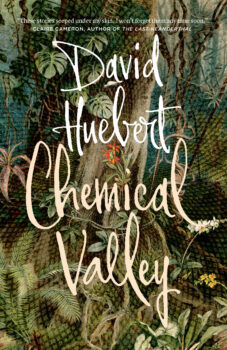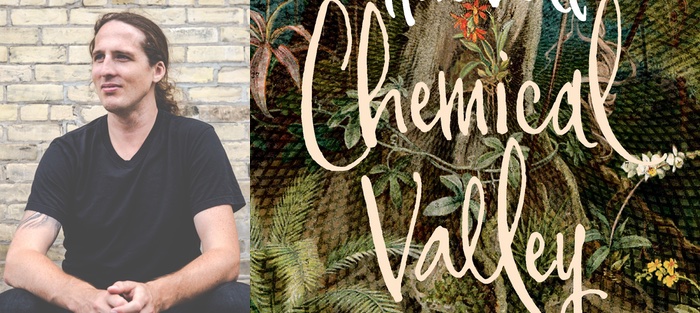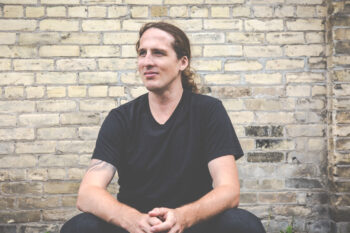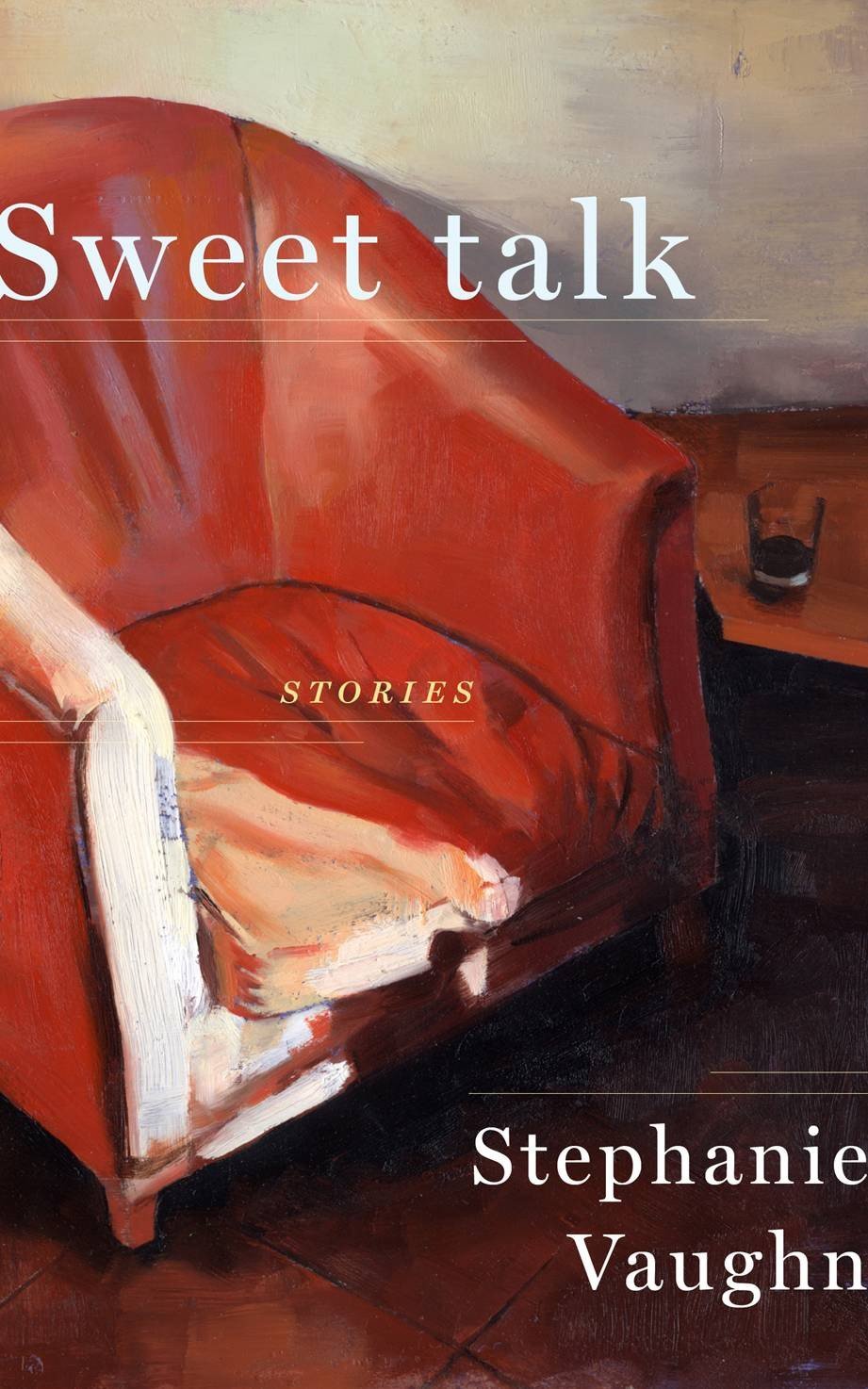I first met Dave Huebert in a first-year undergraduate philosophy tutorial in 2004. Young Dave came in sporting a bleached flow of hair, a tattered Montreal Canadians T-shirt and held a worn skateboard in one hand. His boisterous yet articulate attitude set him apart from the rest of the class. As we became friends, we started a “High Fusion Power Rock” band, which, I can say with confidence, was not very good. In 2008, we headed West for a couple seasons of ski bumming in BC, where I remained to chase snow and plant trees. Dave followed a path back eastward with his future wife, honing his craft as a writer, becoming a scholar and educator.
Dave has published two collections of poetry, We Are No Longer The Smart Kids In Class (Guernica Editions, 2014), and Humanimus (Palimpsest Press, 2020). He has also published two short story collections, Peninsula Sinking (Biblioasis, 2017) and most recently, Chemical Valley (Biblioasis, 2021). Dave’s work has been featured in numerous magazines and anthologies. He has won the CBC short story prize, the Walrus poetry prize, and several other notable awards for his writing.
In addition to enjoying Dave’s work immensely as a reader, each new release is an opportunity to reconnect. While there has been a fundamental shift in the fashion sense, perspectives, and maturity of my old friend, the articulate and thoughtful aspects of his personality have only been amplified by years and experience. I caught up with him over the fall to talk about Chemical Valley.
Interview:
Brad Roach: In your first short story collection, Peninsula Sinking, there is a clear connection between the setting of the stories and their inspiration. Growing up in Halifax, it was easy to see how you drew from that reservoir of memory to build the world for your characters. With Chemical Valley, you have moved away from your birthplace and many stories from this new collection are based in the city of Sarnia. What drew you to Sarnia and made it such a focal point for your second collection?
 David Huebert: Not much fiction has been set in Sarnia, even though it’s a really beautiful and unsettling and astonishing place with a thriving college and good honest people and a wide dazzling blue river that sparkles magnificently on summer days. And sixty-two petrochemical refineries, terrible air quality, rampant environmental racism, and regular leaks of dangerous chemicals like benzene and hydrogen sulfide.
David Huebert: Not much fiction has been set in Sarnia, even though it’s a really beautiful and unsettling and astonishing place with a thriving college and good honest people and a wide dazzling blue river that sparkles magnificently on summer days. And sixty-two petrochemical refineries, terrible air quality, rampant environmental racism, and regular leaks of dangerous chemicals like benzene and hydrogen sulfide.
Sarnia is just down the road from London, Ontario, where I spent six years as I was writing a PhD on ecocriticism and American literature. During this time I was thinking a lot about environmental issues, and I was getting interested in the aesthetics of petroleum. I was astonished to learn that there was a place so close with sixty-two refineries on either side of the river. They blared World War II–style sirens every day as a testing mechanism. There were troublingly regular leaks of contaminants. In the nineties there was a toxic blob of laundry chemical in the middle of the St. Clair River, skull-and-crossbones poison signs around the banks to deter swimmers.
The more I learned about it, the more I felt called to the place. I visited many times, made dear friends there, did writing workshops, talked to refinery workers, attended readings and protests and a Toxic Tour run by the Aamjiwnaang activist Vanessa Grey and the group Aamjiwnaang Solidarity Against Pipelines. I immersed myself in the setting. At one point I got in trouble with a security guard for taking photos. Everyone down at the plants is very concerned about the media, which tells you a lot.
For me, Sarnia is, crucially, a very specific place, with a complex history of petrocolonialism and the gradual whittling down of Indigenous lands. But it is also a kind of every-place. All of us live in ecological precarity, with sites of toxicity just around the next bend in the river.
And yet there are people there. Normal people, great people, beautiful complicated people that really love this city. Of course, certain populations are much more able to “love” it than others, and toxicity is never equally distributed—it is meted out to the racialized and the poor. But I suppose it was that tension, the way we keep on being human, keep on feeling bound to and lifted up by place, despite saturation in toxicity and low-level dread. It’s a fascinating convoluted place that tells us a lot about this slow anti-apocalypse we’re grinding through.
Sarnia as the Canadian every-place rings so true. When I worked in forestry around the town of Smithers, BC, we had a similar air raid siren that many called the “EI alarm clock.” There was always tension between money, resources, and the environment. The Wet’suwet’en blockade nearby has stood on the Morice River for over ten years, Enbridge first and then Coastal Gas. The use of force to protect these oil and gas interests was deeply troubling. The imagery of the Canadian resource town, tucked into every crevice of our landscape, is so relatable, and I like how you capture both the beauty and repulsive nature of that industrial world, maintaining empathy for the folks working those jobs to support their families.
I remember seeing the massive Nadina fire in its first purple bloom of fireweed while doing wood salvage for Canfor. Your zebra mussel river in Chemical Valley reminded me of that strange beauty. During that fire, pyrocumulus clouds shot up into the atmosphere, leading to a desperate evacuation and thousands of contiguous square kilometers scorched to rock. This summer, when the Southern Interior lit up, it felt like the new normal, a smoky stressor that exists with rising temperatures and beetle infestations. I like your description of just grinding through a slow anti-apocalypse. In “The Empathy Pill,” the last story in Chemical Valley, you explore a new parent in a similar burning world. I am curious how you balance such grim prospects often found in your writing and the future world for your two daughters?
This is very thorny, difficult, emotional terrain. We’re living in a difficult moment for anyone to attempt to imagine a future. Received and familiar conceptions of deep time and human possibility have just received a massive wound, and we’ll be sorting through the salvage for hundreds or thousands of years. And that hurts. There is a deep collective angst underlying our social lives; not just eco-anxiety—eco-dread.
This is also tricky, for me, because I think the “future” that has been lost or threatened was always, largely, a phenomenon and fantasy curated by white privilege. Meanwhile, there is the real loss of landscapes and ecosystems, a loss that is already causing death and disease, and that will continue to affect people according to the fault lines of racialization and socioeconomic disparity. There is a particular, terrible pain in watching ecologies suffer and knowing that what that suffering entails is an increasingly difficult world in which to build new and better forms of human and more than human community. Australian philosopher Glenn Albrecht coined the term “solastalgia” to mean something like the loss of your home ecology, represented by projections of massive scale environmental change. I think we’re all feeling this profoundly at the moment—we’re grieving, profoundly, together.
People focus, here, on children, because that’s where (often problematically) our fantasies of, and investments in, futurity lie. For many of us (I find myself resorting to a “we” of white privilege), climate crisis has pulled the rug out from the Eurocentric, settler-colonial fantasy of limitless progress. This has happened much too late. Many racialized, poor, or disabled children have never had access to the green utopic future I was wrongly promised in school. And the truth is that when I was a child the Earth’s ecosystems were already terribly damaged. I think, as organisms, my children would always have chosen life, even if I could have explained how dire and tenuous that life is. And I think as a parent it’s my obligation to make responsible human beings, resilient and armed for an unpredictable future. In a way, I hope that my stories say again and again, “I choose life in the face of these flames.”
I’ve been asked about “hope” a lot lately, and I want to be cautious with that term. You and I were promised hope. But we were growing up in Mi’kma’ki, among long-razed old growth forests and a woefully abused Indigenous population whose language and culture had been stolen, who had been systematically murdered.
I have trouble with this idea of the “burning world.” We see these headlines all the time. “The world is burning.” This is eschatological language, and obviously the imagery of wildfire is very powerful; it is perhaps our most primal collective fear as a species. But it’s also there in the Book of Revelations. The Puritans were walking, all the time, over a very real inferno. I think to be human is to fear fire and flood, and the media around climate crisis tries to mobilize these fears to create action, but often just paralyzes us. We are living in our own deeply Biblical moment. Greta Thunberg might well be right that we don’t need hope. But I also don’t think we need to panic. What we need is a plan.
Of course, the stories aren’t really about these issues; they dwell in them. The stories in Chemical Valley aren’t so much concerned with the problems and solutions of climate crisis as they are interested in the way human beings move through these difficulties in the midst of all the other complexities of our lives. How do we relate to the fungus on our flesh? How do we justly love a so-called “machine”? How do we differentiate the mechanical from the organic? How do we protect our families and try to make beautiful lives together, find shelter from the acid seas? We live in a moment of profound acclimatization, and I’m interested in that—how people are changing and adapting at light speed to a space hurricane of new normals.
We might be living in the midst of a profound awakening, even as we navigate new viruses and ocean acidification, as the whales swallow mounds of plastic and the megarich take to their air-conditioned bunkers, as very real tragedies strike close to home and farther away. I think it’s good to remember that the world that is “burning” might be the world of capitalism and settler-colonialism. Many empires have fallen before, and we are almost certainly living in a long ugly fall. What weeds will grow from the salvage? Maybe it will no longer be possible to endlessly harvest resources, and maybe we’ll find new ways of making, feeding, being together.
“The Empathy Pill,” in a very real way, is just a story. A familiar, old story. A story about a woman staring fearfully into the flames, trying to protect her child. It is also a story that ends with a gift from the ocean, a creature from the deeps. Who knows what strange, unknown forms of life might still be lurking in the Midnight Zone? Throughout Chemical Valley, I wanted to nourish ecological love as much as I acknowledged ecological precarity. I wanted to make a love that danced like dandelions in the breath of parking lots.
In the second half of your collection, “Dream Haven,” you take on such a broad spectrum of protagonists: hockey brawlers, teenage girls, Egyptian Canadians, lonely fungal dishwashers, and nurses in old-age homes. Some of these characters clearly have connections to your personal experiences, such as your ski bum job washing dishes at Denny’s or a youth spent in the rink. Some of these other characters must have required a fair bit of research to accurately portray and explore properly without too much ignorance. As a paramedic with experience in care homes, feculent stomas, and dark humor, I had a couple of laugh-out-loud moments when reading your accurate portrayal of that world and wondered how you ended up writing about nursing. What is your process when portraying a character in different environments, occupations or backgrounds to yours?
As a writer I’m fascinated by jobs, by work. I think there is no better tool for sidling into characters or building authentic settings. Our jobs tell us so much about how we navigate the world, and they are quite literally our means of survival.
Thinking about and researching jobs is a big part of my process as I begin to think through and draft a story. Two of the stories in Chemical Valley, “Chemical Valley” and “Dream Haven,” involved extensive research and interviews. I’m so grateful to the many anonymous nurses, refinery workers, petrochemical researchers, and Sarnia community members who spoke to me. “Chemical Valley” is about an operator in a petrochemical refinery while “Dream Haven” is about a registered nurse in a long-term care facility. Both jobs expose the sense in which we call upon these workers to perform the thankless “essential” work of society. The jobs, of course, are fascinating, full of strange terminology and occult knowledge (the unique and pungent reek of C. diff; the fact that nurses smear VapoRub under their noses before they walk into bedrooms; the scene of a massive school of smelt migrating towards the refinery light at night; the word “enunciator”; or the fact that invisible gas fires can occur inside the refinery). This stuff is my proverbial bread and plant-based butter substitute.
It’s not my style to write too close to my own experience. For me, the joy and reward of writing is about empathy, and I find that the more I push my empathy muscles to try to grasp things beyond my own experience, the more those muscles respond with powerful storytelling, with genuine and far-reaching care.
Care is the theme of “Dream Haven.” I drafted this story in the spring of 2020, when I had grown fascinated by the discourse around healthcare heroism, by the battlefront language of the pandemic. The story ends with an elderly woman, Jane, who has been courting death throughout the story, saying “Take care” as a form of goodbye. Among other things, I was struck both by the idea of “long-term care” and by that expression. Take care. It occurred to me that care is always a kind of taking. That it takes from us as we give it, and at the same time the care is itself a taking. A taking of dignity, say, or independence. There is no such thing as pure care. The story ends in this insight, which seemed to me a worthy revelation. The setting, and the protagonist’s job, allowed me to get there.
On another level, story itself is also a form of care. We write and read to connect with others. In my work, I push myself to empathize as profoundly as possible with lives unlike my own, to tap into the peculiarities of their hurt. I invent people who are nothing like me and then I feel into their struggles and suffering and bruised joys. When it works, I fall in love with them, see that they were always more akin to me than I knew. I work my way tangled into care.
I like that perspective on care, and perhaps that is why “Dream Haven” resonated with me. When I work on an ambulance, the idea of taking something from each call is an intrinsic aspect of becoming a better caregiver. Being with people in the deeply vulnerable states of sickness or trauma and being able to take a modicum of control over the flow of events is a meaningful and personal task. When you hand that person off, your role in their journey is over but what you take from each person is a fraction of that experience, adding to a rolodex of events that help you improve and grow.
I feel like teaching is also a career choice that can have a similar “give and take” element. I read on your book jacket that you are now teaching creative writing. I managed to take a few creative writing classes during my latest stint at UBC Okanagan and I enjoyed them immensely and found the small class size and content refreshing compared to the large lecture hall style classes of many conventional programs. Have you enjoyed teaching in a creative writing program and has it benefited your writing?
I’ve been teaching for a few years now at different institutions and I’m thrilled to have landed at The University of New Brunswick. We have a small, intimate department with the Wolastoq River running full and thick at the bottom of the hill. What I love most is the way the students support each other, find the good in each other’s stories. They work so hard for that. As a writer you refine and refine and refine your craft to the point where it can be difficult to read with fresh open ears again. The students model that daily. They respect each other tremendously, read each other with a kind of wild appreciation. That reminds me what it’s all about, reminds me to read widely and generously, and to take curiosity and benevolence to the page every day. Teaching also reminds me what a privilege it is just to have time and space to think and write, and working through techniques like those in Matthew Salesses’s Craft in the Real World helps renew and refresh my craft.
I also think of the classroom as a space of ecological activism, not just because we’re reading texts that open us to the lovely sick flowers of our modern ecological spasm, but also because simply taking a moment to read or write is to put some glue in the gears of the Great Acceleration. There’s such relief in that. My full admiration these days goes to the slow readers, lazy writers, daydreamers, meandering ponderers.
I have really enjoyed catching up Dave and look forward to your next project. Take care my friend.
Take care, Brad! Thanks for reading, and for your work out there in the weeping wilds.







